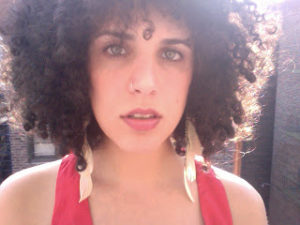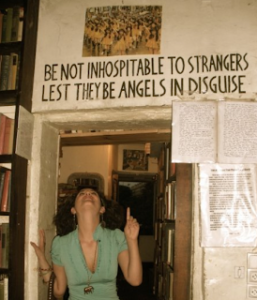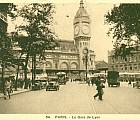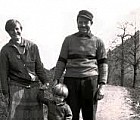
A Village in Spain
August 22, 2018
Hemingway In Key West – An interview With Mike Curry
August 22, 2018Fuck Yeah, Hemingway! An Interview with Hannah Miet
 Dear Friends,
Dear Friends,
I am delighted to introduce you to Hanah Miet, whose interview has been in works for almost a year. As you know, I have been collecting stories and interviews of how Hemingway has influenced his readers. I have learned that the ways in which Hemingway endures are as varied as the people who hold his books in their hands. What fascinates me is how Hemingway’s work belongs to each us in a different way. No matter how many books are published that tell us who Hemingway was or what he intended to say in a particular paragraph, in the end we will take with us part of what we bring to it: our own story, our own dilemmas, entwined with the work and the record of a man who completely understood the potential of his own life.
One of the reasons that I am so pleased to hear from Hannah is that she is a young woman, entirely engaged in the concerns of her own era, which is not the usual profile for someone obsessed with Hemingway. Her website, Fuck yeah, Hemingway reflects her wit and intelligence, and has helped to introduce younger people to Hemingway in a way that is contemporary and refreshingly original. I know you will enjoy her interview.
In the coming weeks I will be posting my thoughts on my first bullfight, along with interviews from Spain and more Hadley audio. It’s great to be back!

Hannah Miet is a freelance journalist and master’s candidate at the City University of New York’s Graduate School of Journalism. She started Fuck Yeah, Hemingway (http://fuckyeahhemingway.tumblr.com), which is open to submissions. (Please submit!)
For excerpts and links to her writing go to http://hannahmiet.com or follow her on twitter http://www.twitter.com/hannahmiet
AB: How did you become interested in Hemingway?
HM: I liked Hemingway when I read him in high school, but the obsession kicked in when I read A Moveable Feast while studying abroad in Paris. I was taking an expat literature course called “Paris Through the Eyes of Travelers.”
It was an intimate way to experience Hemingway, and in such a sensual city. I heard the echoes of another time period.
When I came back to New York, I re-read all the Hemingway books I owned and bought what I didn’t already own. I fell in love with the perfection of his sentences. I’d trace over the good ones before turning the page, memorizing their structure.
AB: You live a very different life than Hemingway did, who was born in 1899 and used a typewriter as his writing instrument, and yet I am sure there are many points of connection. What are they for you?
HM: Hemingway believed in hard work and was also incredibly hard on himself. The former was the key to his success and the latter was the key to his downfall. We have both of these things in common. I see Hemingway’s death as a reminder to hold myself to reasonable standards. I’m just getting started, and good writing takes time.
AB: Why did you start “Fuck yeah, Hemingway” and please explain what Tumblr is!?
HM: Fuck Yeah, Hemingway was fuel for my obsession — an excuse to carry around Hemingway’s books on the subway, re-reading and underlining my favorite passages in order to re-type them later. I also hoped it would reach both Hemingway fans and people who may not have read many of his books, who might find a connection to his sentences.
Oh, and what is Tumblr?: http://www.tumblr.com/about
AB: I love how you bring Charles Bukowski and Notorious B.I.G onto the same page as Hemingway. What do you know of Bukowski’s interest in Hemingway? And how do your readers make the association with Hemingway and these other figures?
HM: I get the sense that Bukowski greatly admired Hemingway and also found himself inadequate by comparison. This is most prominent in “Hemingway Never Did This”:
I read that he lost a suitcase full of manuscripts on a train and that they never were recovered. I can’t match the agony of this but the other night I wrote a 3-page poem upon this computer and through my lack of diligence and practice and by playing around with commands on the menu I somehow managed to erase the poem forever. believe me, such a thing is difficult to do even for a novice but I somehow managed to do it. now I don’t think this 3-pager was immortal but there were some crazy wild lines, now gone forever. it bothers more than a touch, it’s some- thing like knocking over a good bottle of wine. and writing about it hardly makes a good poem. still, I thought somehow you’d like to know? if not, at least you’ve read this far and there could be better work down the line. let’s hope so, for your sake and mine.
As for Biggie and the other memes and mashups I post on FYH, Hemingway is part of pop culture. I think modern remixes and transformations of his work are interesting and it seems like FYH’s followers do too.
AB: What do you think your reader demographic is for “Fuck yeah, Hemingway” and why?
HM: A lot of teenagers follow FYH, but so do many older literary nerds. (I think. It’s hard to determine age on Tumblr.) Hemingway writes very simply and that’s why he gets across to young people. He’s not pretentious. At the same time, the simplicity is only in presentation and there’s depth underneath, which is why there are Hemingway scholars.
AB: There are so many images of Hemingway – as a writer, a sportsman, a traveler, a bully, an artist. His persona extends from kitsch to academic – how do you see Hemingway and what has influenced you to see him that way? What is real?
HM: I don’t buy into Hemingway’s personas. Personas are crafted. They’re never real.
The Hemingway I hold on a pedestal is the writer of great sentences.
In his personal life, he was kind of an asshole.
AB: What is your favorite Hemingway era? Paris, Key West, Spain, Cuba?
HM: Paris. Hands down.

AB: Does Hemingway ever disappoint you?
HM: Frequently. I tried to get through The Dangerous Summer. I couldn’t. Not all of Hemingway’s work is good work.
I also can’t abide Hemingway’s portrayal of women. They are nothing more than vehicles for his male protagonists, for their lust, their love, their unfulfillment. They are not three-dimensional.
A possible exception is Catherine in Garden of Eden, which is Hemingway’s most provocative novel when it comes to gender. Catherine’s and her boo, Peter, switch gender roles throughout the novel. She calls him, “my girl, Catherine” as she mounts him.
But while it’s Hemingway’s best stab at an empowered female character, it still isn’t feminism. Catherine needs to assume the role of a man in order to have dominance. In becoming Catherine’s “girl,” Peter becomes submissive. It admirably stretches, but still reflects, the hetero-normative stereotypes of his time.
AB: How can a woman be like Hemingway?
HM: A woman can be like Hemingway the same way that a man can – by working really hard.
Writing is a science. When I think of female writers who are “like” Hemingway, I think of those who embrace the science of sentences. When Joan Didion was fifteen, she wanted to see how Hemingway’s sentences worked so she began typing them out, feeling their rhythms on her fingertips. “There was just something magnetic to me in the arrangement of those sentences,” she said in the first “Art of Nonfiction” interview in the Paris Review. “Because they were so simple—or rather they appeared to be so simple, but they weren’t.”
Joan Didion also has the “shock-proof shit detector” that Hemingway said every writer needs. She’s meticulous and detailed, but she travels light. There’s no excess, no persona. I think that many young writers confuse having a writerly persona with being a writer. They want to be like Hemingway by drinking lots of whiskey, hunting or traveling. And while emulating Hemingway’s machismo is a fast track to becoming a semi-worldly drunk, it doesn’t make you a writer. Hemingway’s comic book persona, the one he intentionally crafted for us on his African safaris and his boxing bouts and his fishing trips, the one that is parodied in Woody Allen’s “Midnight in Paris,” will teach you nothing about writing. The lessons are in his sentences.
A woman can be like Hemingway by dedicating her life to the craft of writing sentences and working hard to be better. Extra hard, because we still are not seen as equals despite how far we’ve come. We need to be relentless.
AB: If you could meet Hemingway at any point in his life when would it be and what would you like to do?
HM: I have no desire to meet Hemingway. I don’t think we’d get along.
October 3rd, 2011
Filed under: Charles Bukowski , Fuck Yeah , Hannah Miet , Hemingway , Interview – Hannah Miet
14 Comments
- Eric ShonkwilerHaving said that, it can be important to have idols. Knowing they fall lets us know we can, too.
- Miet is right. The Hemingway to praise as writers is the writer–or even more accurately, only the writing. There can and should be a powerful divorce between creator and creation. They are very different things and oftentimes the creator is much less perfect than the creation.
- Rich
- Love this blog post Allie ! How do you find these amazing people ? This interview with Hannah Miet was well worth the wait.
- Andrew Levingston
- Hannah sure sounds like a a character, I am impressed at how even the younger generation has a fascination with old hemmy. Great Work Allit
- DickyI got here via HM Twitter feed. I used to read the poetry and stories on her blog, but she doesn’t do that so much now days.
- Sadly I’ve never actually read any Hemmingway (is that legal to say here) – I know it’s shameful. Where should I start?
- Loved the interview Allie(great blog).
- Joe
- A very interesting interview with Ms. Miet. A different perspective than the usual Hemingway fan. Allie always has an open door policy and it’s interesting to see an obvious Hemingway fan speak so candidly about him. A fascinating read.
- Nikon
- I think that Hemingway, his contemporaries, and the milieu of Paris in the 1920’s would meet with approval of anyone seeking an avant garde lifestyle.
The artist colony of expats and Parisians was liberal and tolerant;
the Roaring Twenties transported.
I think that Ms Miet would love that era in Hemingway’s life. - Allie BakerThanks for your comment, I’m glad you enjoyed Hannah’s interview and the blog – I’ve had a lot of fun doing it.Allie
- A lot of people fall in love with Hemingway after they read “A Moveable Feast”, which is all about his early years as a writer in Paris. He wrote it as an older man looking back on his life. I’m sure you will notice what Hannah is talking about when she admires his sentences!
- Hi Dicky,
- Matt
- it’s nice to hear about E from this very intelligent and interesting young woman. She’s got a good point about him being a master of the sentence (simple yet powerful), and her own fascination with the craft definitely comes through. Thanks for another great interview Allie!
- Anonymous
- I enjoyed this interview very much. Hannah’s comment that if she met Hemingway she probably wouldn’t like him tells me she’s a smart girl. Appreciate the writing not necessarily the writer. Anyway, keep up the good work.
- Hovito89
- His persona, as well with other inspiring figures, is almost a necessary evil. For without it, many would not have been introduced to their work.
- Janet Hulstrand
- A wonderful interview. HM is fantastically talented, dedicated to the pursuit of excellence, and so so smart. What a pleasure it was to teach her, and how great to see where she has taken her interest in Hemingway, and how she is sharing it with others.
- Janet Hulstrand
- P.S. Hannah Miet! I did not mean to refer to Hannah with only her initials, but there’s no way to edit a comment (or at least no way I know). Remember her name, and follow this talented, smart young woman!
- Allie Baker
- Janet, I totally agree with you and so do many of my readers. Hannah is a delight and I look forward to everything she writes. Thank you for your comment – Allie
- Laura
- “The artists’ colony of expats and Parisians”, while they were brilliant and drank to excess was hardly liberal and tolerant. If you’ve read a lot of Hemingway and Fitzgerald you know that both of them were
anti-semitic, racist and sexist to an extreme, often using hate words in their prose and letters for Jews blacks and Italians.. As I read the otherwise amazing work of these geniuses I find it sadly dated. Hemingway’s super-macho attitudes and hunting obsessions would be laughed at today. That said, their work is nevertheless stunning and will be read, no doubt, for centuries.


